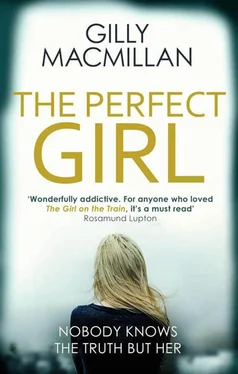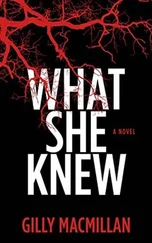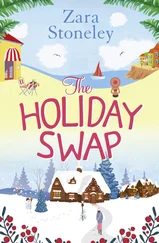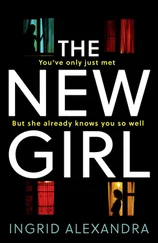In the train, emboldened by a surfeit of caffeine on an empty stomach, I said, ‘Has it helped Lucas get over his loss, to be part of this new family?’
‘Very much so.’ Chris’s answer was swift and sure.
‘How did his mother die?’
‘She had a terminal brain tumour, a particularly savage one.’ He spoke in quite a clinical tone, but his hand twitched on the table and he began to turn his BlackBerry over and over in his palm.
‘Oh. I’m so sorry.’ And I was. I felt a blush creeping up my neck and across my cheeks. ‘I shouldn’t have asked.’
‘I don’t mind. Lucas was devoted to her of course but it wasn’t easy towards the end. She wasn’t very stable. I, we, Lucas and I are so very grateful that Maria agreed to marry me. She’s a wonderful woman, your sister. I’m a lucky man.’
That day on the train I wondered if Maria had done the right thing keeping Zoe’s past from Chris. Surely, I thought, that can’t last. I resolved to advise her to tell him, when the moment was right, when he would surely understand. But the conversation never worked like that, because when I brought it up Maria was appalled. I was not, ever, ever to consider interfering in her and Zoe’s life like that, she told me. She had found her soul mate and she was going to do everything she could to make it work for her and for Zoe. I was to keep quiet about their past and keep my nose out of their business.
And so I did, but in the concert hall on this stifling night I wonder again if that decision isn’t destined to bite us all.
I dismantle the camera and tripod set-up clumsily, and when I join everybody who’s enjoying a post-concert drink I notice that the atmosphere still isn’t quite the usual one of satisfaction, where the audience appears to bask in the pleasure of exchanging opinions about what they’ve just heard. Tonight it seems more conspiratorial. People are huddling, and some are discussing Lucas’s performance, but most, I can tell, are talking about the outburst.
I strip the cling film from two plates of food that have been laid out on a trestle table at the side of the room. Each has a selection of little snacks on them, which Maria made herself.
Lucas appears beside me, and he looks white. ‘Well done,’ I tell him. ‘You played beautifully.’ I say this even though it isn’t entirely what I believe, and I touch his arm lightly because he’s a nice kid and I always seem to have this urge to reassure him even though he’s incredibly composed; maybe because he’s incredibly composed.
‘Is Zoe all right?’ he says.
‘I think so. She’s with her mum. I’ll call them in a minute.’
‘Should we go home?’
‘I’ll drive you and your dad back very soon.’
‘Do you…?’ He wants to ask me about what happened, I can see that written all over his face, but I say, ‘Let’s talk about it later, OK?’
He looks at me, and now he’s wearing that inscrutable gaze of his again, and after only a fraction of a pause he begins to help me.
Chris peels away from the crowd discreetly after about twenty minutes, and we find Lucas sitting in a pew in the church, doing something on his sleek little tablet, which he hastily slips into his music bag.
In my VW bus, they both seem huge: all knees and hunched shoulders.
We travel mostly in silence.
Zoe and I didn’t talk for long that first time we met at the police station in Barnstaple. I mostly wanted to introduce myself, to reassure her as much as I could, and explain to her that I was there to help her. I wanted to try to gain her trust before detailed questioning began. And I didn’t want to start that until I’d spoken to the officer on the case, to get disclosure.
I met him in the custody reception area. After a brief handshake, we took a seat in a room similar to the one that Zoe was waiting in. He had a broad, whiskery face and Punch and Judy red cheeks. His uniform was tight around the belly.
He handed me the charge sheet and told me that he was going to make an audio recording of the disclosure too. That’s sensible, it’s a record of what’s taken place so there’s nothing to argue over later, because that’s my job, to find holes in the evidence: procedural or actual, it doesn’t matter, either can serve my client.
He told me what they had, all of it. The police don’t have to do this, they can be slippery, and disclose in stages, drawing the process out if they’re inclined to. I’ve had disclosures that dribble out over hours, interspersed with exhausting client interviews where we’re forced to run a ‘No Comment’ defence because we don’t know what they’re going to pull out of the bag next.
Zoe’s disclosure was forthright, succinct and the content was as depressing as possible.
When you get a good, honest exchange with an officer in this situation, normally it restores your faith in your profession, gees you up for the daily grind of criminality, because that well-behaved, professional exchange between you both feels like an honourable thing; it pushes away the thoughts of the shysters and the ambulance-chasers, the doughnut-munchers and the baton-wielders. You become two men, in a room, upholding the law, and there’s a purity to that, a kind of distinction, which is a very rare thing on a day-to-day basis.
In Zoe’s case, it only made things slightly more bearable, because the facts of her arrest were so unremittingly grim.
‘She’d got herself out of the car when we got there,’ he said. ‘But she was definitely the driver. We breathalysed her at the scene, seventy-five mg.’
My heart sank because that reading was well over the limit. She must have consumed a great deal of alcohol to be that drunk, even given her small size.
‘Three passengers in the car,’ he continued, deadpan, though it was tough stuff to read out, even if you’re a professional. ‘Front passenger dead at the scene, rear left-side passenger dead at the scene, rear right-side passenger transferred to Barnstaple Hospital.’
He caught the question in my gaze but shook his head.
‘Died half an hour ago. Massive bleed to the brain. Family agreed to turn her off.’
‘Christ.’
‘I’ve seen some scenes, but this was really bad. And there was music pumping from the car, you could hear it on approach, made for a strange scene, spooky.’
I imagined the black night, starlight above, headlights parked at a crazy angle, a steaming engine, crumpled bodywork, shattered glass and the stereo still blasting out a loud driving tune to the broken bodies inside, only two out of the four of them producing wisps of misty breath in the cold darkness.
‘She consented to a blood test at the hospital,’ he continued. ‘Confirmed she was well over the limit.’
‘Zoe consented?’
‘And the doctor.’
I might have had something to work with if Zoe alone had consented to a blood test, because of her age. It was another situation where she had to have an ‘appropriate adult’ advising her. I was pretty sure the police had this one taped, but made a note that it was something to check.
‘Road traffic report?’
‘Ordered.’
‘How long for that?’
‘As quick as we can make it – end of the week probably.’
At this early stage in proceedings, part of my job was to be sure that the police had the evidence they needed to prove all the elements of the offence that the prosecution would present at court. We would need all the test results and paperwork in before I could make a proper judgement on that, but the heaviness in his voice and the apparently rigid adherence to protocol told me that as far as this area of the investigation was concerned, things weren’t looking good for Zoe. If I was going to find a defence for her, I suspected it was unlikely it would lie in the procedural detail, or the facts of the accident or the quality of her treatment afterwards, because, so far, the police appeared to have done everything by the book.
Читать дальше












